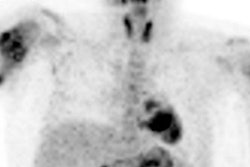Increasing the radiotherapy dose for prostate cancer patients reduced their likelihood of developing recurrent cancer and metastases, but it did not improve their odds of survival, according to the results of a large-scale trial published online March 15 in JAMA Oncology.
In the randomized phase III trial, NRG Oncology and Radiation Therapy Oncology Group (RTOG) researchers studied the effect of elevating the radiotherapy dose for men with intermediate-risk prostate cancer.
The 748 patients who received the higher dose of 79.2 Gy in 44 fractions via either 3D conformal radiotherapy (CRT) or intensity-modulated radiotherapy (IMRT) had the same eight-year survival rate as the 751 patients who received the lower dose of 70.2 Gy in 39 fractions. The higher-dose patients also reported more adverse events in the gastrointestinal and genitourinary tracts.
However, the higher-dose group underwent fewer salvage therapies for tumors that had grown or spread to another region of the body.
"If we can safely deliver the higher dose of radiotherapy, my opinion is to do that," said study chair Dr. Jeff Michalski of Washington University School of Medicine in St. Louis in a press release. "But if we can't achieve those 'safe' radiotherapy dose goals, we shouldn't put the patient at risk of serious side effects down the line. ... It's important to develop treatment plans for each patient on a case-by-case basis."



















